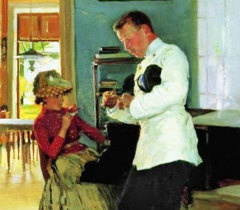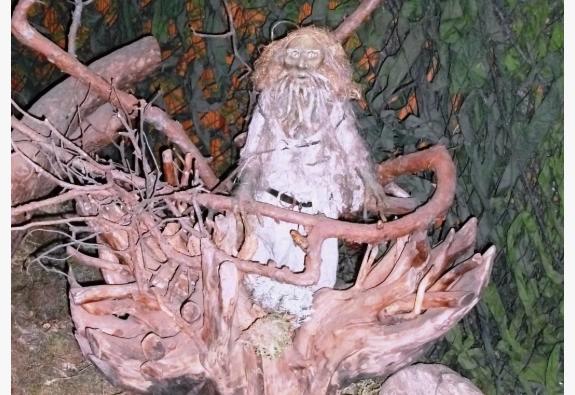
Life in a modern metropolis is like a race for survival – a multitude of daily events, city dwellers rushing to work, buses hastily pulling away from the stop, the hustle and bustle of evening chores… We're used to living at speed, and perhaps that's not such a bad thing.
You quickly get used to the fast-paced city life, and you know what starts to irritate you the most? Forced pauses: stuck in traffic or waiting in line, for example. Unsure what to do during one of these breaks, I started sifting through the books I'd loved most at different times in my life and devoured in one gulp. It turned into such a fun, compact library that I even wanted to reread some of them.
For a long time as a child, I was madly in love with L. Kuzmin's fairy tale “Captain Koko and the Green Glass,” because inside each of us lives a brave traveler who dreams of getting rid of everything boring and monotonous around us.
The characters in Eno Raud's fairy tale “Muff, Half-Boot, and Mossy Beard” captured my childhood imagination with their unusual names and vivid images.
Of all the works by A. Lindgren, who did not like to write for adults, the closest was “Pippi Longstocking”, which charmed with its childish independence from adults and cheerfulness.
Childhood brings a stronger fascination with all sorts of mysteries, whether it's searching for ancient treasure or investigating mysterious events. Enid Blyton's children's detective stories were a favorite among my heart's content. My mother brought most of the books from the library; “The Mystery of the Spider and Sapphire” was still at home, but my favorites were the stories about the “Fab Five.”
Kir Bulychev's collection “Prisoners of the Asteroid” stirred my imagination with its space adventures, was easy to read, and regularly reminded me of itself during summer vacation with screenings of the film “Guest from the Future.” And overall, the stories about the girl Alisa Selezneva seemed so sincere and relatable that I almost believed in the reality of both the main character and the events described.
Bel Kaufman (Up the Down Staircase) made us look at school life and its inhabitants through the eyes of a teacher, and also provided an opportunity to compare educational processes in our country and abroad.
Undoubtedly, Alexandre Dumas's famous “Three Musketeers” was read cover to cover for many, many years. It's still a joy to remember how much fun it was with friends to role-play the confrontation between the Cardinal's guards and the musketeers, unravel court and palace intrigues, and fence with wooden sticks.
One of the kindest books for me was Harper Lee's “To Kill a Mockingbird.” As an adult, I discovered the novel's author was a woman, and I was also surprised that it was her only literary experience.
The very controversial and rather withdrawn writer D. Salinger simply knocked me out of reality for several days with his collection about the Glass family, the culmination of which was the story “Zooey.”
The sparkling A. T. Averchenko invariably lifts the spirits with his humorous gems. One day, in class, our teacher read us “The Incurables,” and for months afterward, the entire class would shout, “And then it all started!” at any reasonable excuse.
Regarding A. Conan Doyle, the situation is strange: I adore all the series of films about the adventures of Sherlock Holmes and Dr. Watson (played by V. Livanov and V. Solomin, of course), but I prefer to return to the pages of “The Lost World” and “The Poison Belt.”
O. Henry's works are a wonderful timeless stress reliever. They're a snap to read thanks to their compact size, abundant dialogue, and the author's effortless style. I still frequently use the description from “The Cellar and the Rose”—”He was as fresh as a young radish, and as simple as a rake”—in my daily life. Precise, apt, and succinct.
J. Hašek's story “Wine of the Forests, Wild Strawberry Wine” is just as effective at creating a positive mood. The only downside is that it makes you desperately want to find this wine and taste it. At one point, inspired by what I read, I even wanted to start making liqueurs at home.
R. Zelazny's “The Chronicles of Amber” really captivated me and interfered with my exam preparation. I find myself wondering why cinema has ignored such a brilliant fantasy plot with such a diverse cast of characters.
A. and B. Strugatsky seemed simply outstanding and unlike anything else. I liked almost everything, but the novel “Burdened by Evil” was the most memorable. Perhaps because it reminded me a bit of “The Master and Margarita” by M. A. Bulgakov, whose “Notes of a Young Doctor” is my favorite.
A detective adventure novel I read in one sitting was “Gene Green – Untouchable.” It's the work of three writers under the pseudonym Grivadiy Gorpozhaks (a fictitious name composed of parts of the authors' real names).
M. Yu. Lermontov has an unfinished story called “Shtoss.” When I read it as a schoolgirl, I found it terrifying. I read it at night, alone at home, and it was a bit creepy. It would be interesting to reread it now and compare impressions.
At one time, it was a real discovery for me that among F. M. Dostoevsky’s deeply dramatic works, there are real comedies, such as, for example, “The Eternal Husband”…
The result—without any pretense of classification—is simply a list of literary works I've loved over the years. For a moment, I even regretted not keeping a reading list in school, as we were taught. After all, shared books are shared memories, games, dreams, aspirations, a circle of like-minded people.
I'm also curious to see which books will stand the test of time and appeal to the next generation. It will be fascinating to compare what our parents enjoyed reading, what we read, and what our children will read.





